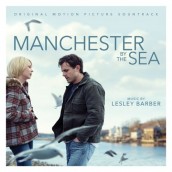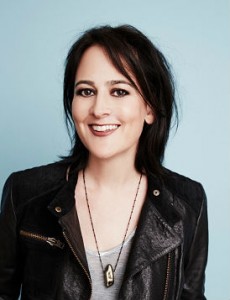
MANCHESTER BY THE SEA composer Lesley Barber| ©2016 Lesley Barber
Flowing with melodic grace from classical to electronic music, Canadian-born composer Lesley Barber is often an inward traveler when it comes to her character portraits. Amongst her numerous, and eclectically-styled scores, Barber has played the music of a woman trying to break out of WHEN NIGHT FALLS, found the inner courage within the Hebraic rhythms of a Hasidic wife discovering that she has A PRICE ABOVE RUBIES, or discovering the intoxicating darkness within a potential girls school while suspensefully reading THE MOTH DIARIES.
Given Lesley Barber’s unique way of playing relationships, perhaps her most rewarding, if too long apart collaboration is with writer-director Kenneth Lonergan. For the film debut of this truly unique voice of indie American cinema, Barber found classically-inflected rhythms in upstate New York while depicting the tumultuous relationship between a bank teller and her wayward brother in 2001’s Oscar-nominated YOU CAN COUNT ON ME. Now, fifteen years later, Barber renews that elegant, sad bond with Lonergan in the Massachusetts’ town of MANCHESTER BY THE SEA.
As with Lonergan’s bitingly ironic works that somehow manage to find wit within the depths of melancholy, MANCHESTER finds the downcast Lee Chandler (Casey Affleck) pulled back to the place, and people that caused him to retreat into a silent shell. But with his brother dead, Lee must now assume unlikely guardianship of his nephew, and become human again in the slow bonding process. Just as much as a youth draws him out, Barber uses her gently lyrical powers of classical persuasion to bring out Lee’s emotional epiphany. Joined by numerous Handel pieces, Barber employs a beautiful A Capella voice she knows well to give “Manchester” an elegiac quality. A sharp, rhythmic theme swirls about with ennui, where gentle strings cast a pastoral spell from the seaside. Lyrically flowing from self-pity to grief and rebirth, Barber’s solemn, yet finally enervating score again shows her subtle, psychological mastery of scoring, no more so than in the presence of a deeply humanistic filmmaker who brings out her poetic tenderness.
ASSIGNMENT X: Tell us about your musical background, and what attracted you to both modern classical, and film composing?
LESLEY BARBER: I was a self-taught musician as a kid and started improvising and writing music at that age. Later, when I was 11 or 12, I started taking formal piano lessons and continued to compose as well. I studied composition at the University of Toronto – with a fairly intense focus on electronic music and orchestration. During that time, while I was completing my Master’s degree I was really drawn to the independent theatre and film scene in Toronto, and began actually working at a theater. Later I began scoring theatre productions, which quickly led me to scoring feature films. When I scored my first feature, Patricia Rozema’s WHEN NIGHT IS FALLING I felt like I found my niche – – I loved the collaboration process and the power of music in the story telling.
AX: Were you surprised that you’d start out scoring an animated series with Maurice Sendak’s LITTLE BEAR?
BARBER: Working with Maurice and scoring LITTLE BEAR was a great experience — although not my first. I had already worked on features and this was more of a fun thing that I thought I would try. Maurice Sendak had called me and we talked a lot about music – especially the music of some of his favorite composers – Shubert and Mozart, and how we could do something special and different with the show. We wanted to do a score with only live players – quintets, and sometimes octets of strings, piano and winds – completely rare in the world of animation series these days. Maurice had a deep knowledge of classical music and so it was a complete pleasure to work with both Maurice and his producing partner John Carl. I was turning around a show each week and thoroughly enjoyed the collaboration.
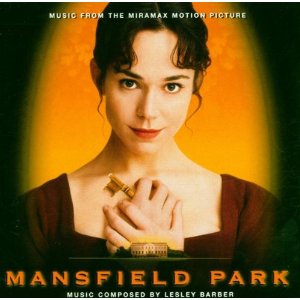
MANSFIELD PARK soundtrack | ©2016 RCA Victor
AX: You’d followed up MANSFIELD PARK with THE REAL JANE AUSTEN. Do you have a particular affection for that author and her work? And were you ever worried about being pigeonholed into becoming a “costume drama” composer?
BARBER: MANSFIELD PARK seemed like a wonderful project. The script was extremely absorbing. I had worked with the director and writer Patricia Rozema before, and had just completed another Miramax project. I knew it would be an interesting scoring experience. Also, I wasn’t concerned about the costume drama aspect, as Rozema wanted a score that avoided the conventions of period dramas. She was not interested in a pastiche approach — She wanted something different – a gorgeous score that reflected the era but also felt contemporary and felt more present in the film than the genre often asks for. The orchestration for instance reflected instruments that may have been found on an estate like Mansfield Park at that time – not only instruments from the 19th century but also instruments that may have been left from eras past – viols, glass harmonica, hurdy-gurdy. It was great to live and work in London during that time and record with the musicians in London at Abbey Road and Air Studios. I was also scoring LUMINOUS MOTION, A PRICE ABOVE RUBIES and YOU CAN COUNT ON ME around that same time and loved the diversity of the films I was scoring.
AX: Another notable score you did was for Mira Nair’s telefilm HYSTERICAL BLINDNESS. How was that experience?
BARBER: Mira Nair is a really wonderful director to work with. Like Kenny Lonergan, she brings the composer into the collaboration early in the process and there’s the time and space to create really specific thematic material as well as develop a palette of ideas, sounds, rhythms and themes that can be developed in the score. Mira’s feedback and comments always felt spot on and helped take the music to the next level. We scored a lot of it in New York and mixed at Sony Studios. The score was a real hybrid — and included a multi-tracked combination of bass/ 3 cellos/1 viola/4 violins to create a really particular string sound, in combination with programming and percussion loops and some atmospheric guitar work that feels almost like the weather in the piece, or a source of light or shadow in some of the scenes.
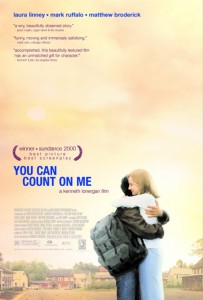
You Can Count On Me | ©2016 TSG Pictures
AX: What do you think drew Kenneth Lonergan to your work? And what was your first collaboration with him like on YOU CAN COUNT ON ME?
BARBER: I’m not sure what drew Kenneth to my work. A mutual colleague had given him a copy of some of my music and Kenny liked it. We were in touch, and then later met up in New York and started the collaborative process. With “You Can Count On Me,” we were both just beginning our filmmaking careers, and we were both learning the process of bringing the right score and sound to a story — creating a strong score. We both like to hold off on being decisive about our themes until we are sure we have the right one — and we’re sure the themes really work and bring the scenes to a new level. With YOU CAN COUNT ON ME for instance, we also worked together to get the right sound in the cello duet in the main theme and even rerecorded some of the pieces when we felt the performance approach wasn’t exactly what we were looking for. In some collaborations getting the recording right might be a smaller detail but for Kenny and I we both want to bring the right emotional sound quality to the score and take the time with the performers to get what we’re looking for. Both scores are highly thematic and in both films we often revisit a theme in a way that deepens the meaning of each musical recurrence and the scene as well.
AX: Given your classical background, was MANCHESTER BY THE SEA an opportunity you were particularly drawn to, especially given its contemporary setting?
BARBER: When I read the script for MANCHESTER BY THE SEA I was immediately drawn in to what Kenny had written and the character of Lee Chandler. I wanted to score the film. Between the films YOU CAN COUNT ON ME and MANCHESTER BY THE SEA, Kenny and I have both evolved. We both have had the strength of working with other people and then coming back to work together again on MANCHESTER. Over that time, we’ve grown as filmmakers and artists and that could be felt in the collaboration, and in the film and scoring, and it allows us to make some strong choices about how we’re going to score the film. Those are choices like the use of the a capella voices, or the particular strings sound — deliberate choices about sound and score design that fell into place quickly. I think we’ve developed a somewhat of a shorthand in this regard.
AX: Did your creative collaboration with Kenneth differ on this film?
BARBER: In both YOU CAN COUNT ON ME, and again in MANCHESTER BY THE SEA, Kenny includes borrowed pieces from the classical era. In YOU CAN COUNT ON ME we worked with the Bach Unaccompanied cello suites and a Cantata amongst others, and in “Manchester” mainly Handel as well as the blues standards and other on screen music. The original score is the music that returns and creates the recurrent musical themes in the movie, and blends and supports and unifies all the pieces in the film. The composed pieces needed to have a kind of strength in their design to work alongside the classical pieces so they couldn’t simply be a narrative, traditional score. It’s a really specific approach that Kenny and I have used in our collaborations but has evolved and strengthened over the time working together.
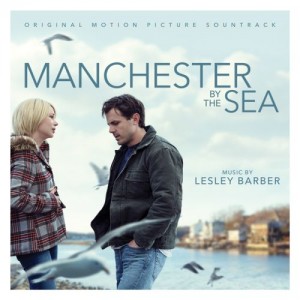
MANCHESTER BY THE SEA soundtrack| ©2016 Milan Records
AX: How did the numerous selections by Handel influence your score? And were their modern classical composers that impacted your approach as well?
BARBER: I wrote the first themes for MANCHESTER after receiving the script. I always like to put together a collection of pieces, almost like a musical suite of thematic ideas, to share with Kenny and discuss. One of the first pieces was the piano solo that we hear as Lee looks for a job midway through the film after he considers staying in the small Massachusetts’s town that he returned to. This became an active theme in the score, which then influenced the harmonic progressions we hear in many of the cues. The other piece that I recorded as a first demo was the “Plymouth Chorale” that we hear during Lee’s drive to Manchester and also while Patrick walks to his father’s funeral. Kenny had my first recordings with him while he was editing and found that the a cappella pieces were really working well with their harmonies, simple melodies and vocals.
After the themes started falling in place, I scored the rest of the music after seeing a fine cut of the film. For the opening piece, I recorded a choral piece – an a capella piece, in a concert hall in Montreal. The vocals in the first piece, and the recording approach work with the epic opening shots of the ocean, the boat with the boy and man seen from the distance, and the weather and atmosphere of that shot. With the string theme there is a kind is a transformation of the sound over the course of the film. In the opening cue the strings are barely there — with a kind of simple starkness, big, slightly dark sound. Over the film the string sound evolves and opens up into a much bigger sound — the string writing becomes more active. Then, in the final cue, we’re in a new place. We can feel that in the scoring and string arrangements, performance, and recording style.
The choice of themes was originally very intuitive — just an idea that I felt was right. For the A Capella themes, I wanted to do something simple, almost hymn like, but in a way that the theme and phrases can loop and move and progress almost infinitely with a kind of elliptical repetition that you sense but can’t define. I looked at the early hymns – psalmody — that were sung by the Puritans and Pilgrims when they settled in that same area of the small Massachusetts’s town that Lee has returned to. There was something in the melodies and harmonies that I felt was a great inspiration for where I wanted to go compositionally for this film. As the themes developed and I chose to multi-track record one vocalist — Jacoba Barber Rozema on all the vocal lines. She has a really gorgeous clear voice – a lyric soprano with a lot of control over vibrato and color. The orchestra was recorded later – in the last few weeks before the mix and added in as another layer to the scoring.
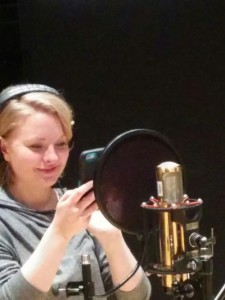
Manchester vocalist Jacoba Barber-Rozema | ©2016 Jacoba Barber-Rozema
AX: How did you have the idea of using your daughter for the female voice of MANCHESTER?
BARBER: While I was working on the theme I really wanted to hear the vocal arrangement in performance and Jacoba has a beautiful voice that seemed exactly right for this. She is a trained opera singer and performed as a child in several productions at The Canadian Opera Company. We recorded the first piece via Skype so she could record in her dorm room at McGill where she is studying opera performance. Later, we recorded some of the additional a cappella pieces in a large concert hall to get a more expansive sound that works with some of the exterior shots in the film.
AX: You’ve often played characters struggling to find their voice in movies like WHEN NIGHT IS FALLING and A PRICE ABOVE RUBIES. Is that something you look for, especially now when you have such a withdrawn person like Lee in MANCHESTER BY THE SEA. What’s the importance of the music in drawing him out of his shell?
BARBER: In most stories and films, we meet a central character that is longing for something, and for whom a great deal is at stake. There is often a sense that there is the potential for possible violence – either psychological or physical, so there is this central pull of character and story that needs to be reflected and lifted in the music. We meet Lee Chandler after he experienced the unimaginable, and he can’t leave it behind. His tragedy hangs over his head no matter what he does or doesn’t do and the music had to get inside this place.
AX: Was it important not to make the score too depressing? To have it reflect a ray of hope, even when Lee might not?
BARBER: This wasn’t really something I thought about consciously when I was writing. The themes have a kind of “moving forward” quality to them. Momentum in the harmonies that travel forward almost inevitably and perhaps this was something in the back of my mind when I was writing. Kenny just described the score like this – – “The music skips your brain and goes straight to your emotions.” The a capella piece had an almost angelic quality, a simple melody with complicated harmonies. It’s the aural equivalent of including the sky in a shot. You see a street and you tilt up to reveal this big sky over it. Music does that. It changes the perspective and adds color.
AX: What strength do you think being a conductor and an orchestrator add to your work as a composer?
BARBER: I think it helps to understand the communication part of music and what works and doesn’t work for performers – and how much the musicians and performers bring to the music — what’s essential in the orchestration — and also to come up with a specific orchestral approach for each film score. With MANCHESTER BY THE SEA, I just had a week to turn around the orchestral pieces in the film – compose, orchestrate, record, produce and deliver. The timing was tight and I think knowing what I want from the orchestra and how things will sound helps me write with a kind of confidence that I know what I’m looking for. I also often also work with the fantastic orchestrator James Shearman, who has become an important collaborator in my work as we move the music from score to the recording stage.
AX: Why do you think Kenneth is so seemingly reclusive as a filmmaker? And do you hope the success of MANCHESTER BY THE SEA might encourage him to make more films?
BARBER: Kenny’s actually really prolific — he has written many award-winning plays and written scripts for a number of projects at the same time, he’s developing his own films and scripts. The three films he made over the last ten years are just stellar films, from the script to the direction to the finished edit and finished film. I would imagine he’ll have many more great films ahead of him. We can certainly hope that MANCHESTER BY THE SEA makes that real.
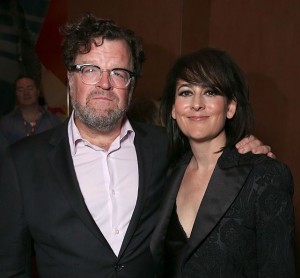
MANCHESTER BY THE SEA writer-director Kenneth Lonergan and composer Lesley Barber| ©2016 Lesley Barber
AX: Do you think that film scoring is essentially what’s become of classical music, and do you think there’s a renaissance now for film composers who come from the world of “serious” music?
BARBER: Cinematic writing is a great opportunity for a composer. It gives the composer an opportunity to work with orchestra and performers and a scale of writing that is rare in the classical and opera world these days.
I think for filmmakers who are looking for a next level kind of scoring they are often looking for a composer who can write orchestrally and build significant melody and harmony into the thematic of the score. My own approach is more hybrid and really film specific. It’s combining atmospherics, synth tracks, loops, beats, sampled orchestra, building specific sound palettes for each film and then combining that with orchestration. Sometimes it’s also breaking that out into a tight edgier intimate chamber sound against a more lush orchestral bigger sound.
AX: As a Canadian in an industry that can often be sexist in the kinds of movies that female composers get, when they are hired, how do you look upon what’s happened politically in America? And do you think it will have any impact on the entertainment industry, especially in regards to women?
BARBER: The female composer aspect is something I haven’t thought that much about over the years. Recently it’s become obvious in the industry that it hasn’t been inclusive enough. We need diverse voices as they add fresh language to cinematic writing. It’s the same issue faced by female directors and cinematographers. It feels like things are definitely changing. There’s more visibility, more awareness, and a consciousness that we’re moving in the right direction.
AX: What kinds of films are you personally motived to do? And having done so many unique scores for intimately dramatic films like MANCHESTER BY THE SEA, what kind of movies, or genres would you like to explore musically?
BARBER: I love the kind of films I’ve been working on, and would love to work on a futuristic or large scale animation film — I would like to work on some kind of science fiction / futuristic sci-fi like BLADE RUNNER or something more contemporary like HURT LOCKER. That would be great.
Visit Lesley Barber’s score for MANCHESTER BY THE SEA on Milan Records HERE.
Make a deal for Lesley Barber’s “A Price Above Rubies” HERE fly with “The Moth Diaries” HERE and visit “Mansfield Park” HERE
Visit Lesley Barber’s Website HERE
Follow us on Twitter at ASSIGNMENT X
Fan us on Facebook at ASSIGNMENT X
Article Source: Assignment X
Article: Interview with MANCHESTER BY SEA composer Lesley Barber
Related Posts:




